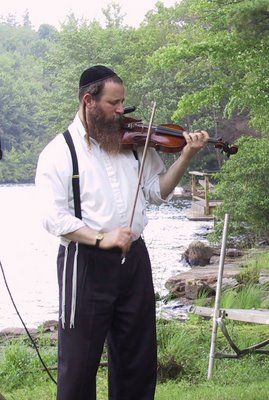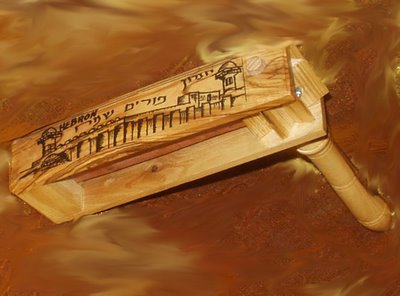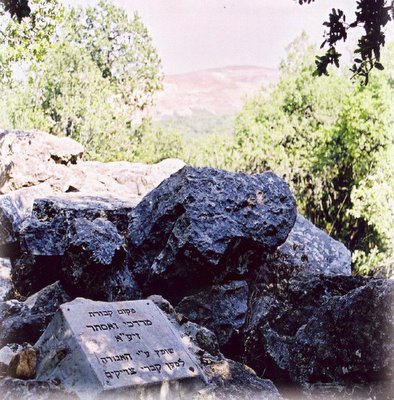A Simple Jew asks:
While I was reviewing books on the subject of Purim, I ran across this teaching from Likutey Moharan II, 74:
Purim is a preparation for Pesach. Through the mitzvah of Purim we are protected from chometz on Pesach.In my slow-paced learning of Likutey Moharan, I have not yet reached this lesson. I can't say that I fully comprehend what Rebbe Nachman of Breslov is trying to teach us. I know that joy is the main aspect of Purim and that chometz symbolizes the character trait of arrogance. I don't yet understand how the joy we experience on Purim helps protect us from arrogance.
Rabbi Dovid Sears answers:Like most of Rebbe Nachman's teachings, this lesson is full of mysteries. This reflects Reb Noson’s words in his Introduction to
Likkutei Moharan, citing the Gemara (
Chagiga 13a) that in mystical matters, one must simultaneously reveal and conceal. This is particularly true of Rebbe Nachman’s teaching style. So whatever we say must be understood as speculation only.
1.) On a basic level, the Rebbe is
darshaning on the "coincidence" that in the Jewish calendar, Purim is followed by
parshas Parah and then by Pesach, and he finds profound meaning in these connections. Even though the miracle of Purim took place more than one thousand years after
yetziyas Mitzrayim, the paradigm it represents "paves the way" for Pesach.
Rebbe Nachman states: "Through Purim, we are protected from chometz on Pesach." Purim represents hidden miracles,
be-derekh ha-teva'; Pesach represents open miracles,
le-ma'alah me-derekh ha-teva'. Purim shows us that what appears to be natural is truly supernatural. It elevates us above nature, above ego, and destroys Amalek, which represents
p'gam ha-bris (symbolized by the fact that the Amalekites sexually mutilated their victims) and disbelief (the word "Amalek" =
gematria "sofek," or doubt). Thus, Purim protects us from
chometz, which variously represents ego,
ta'avah / lust, and the illusion of nature as autonomous -- the antithesis of Pesach.
2.) Rabbi Borukh Ephraim of Homel, a
talmid of the Tcheriner Rov and author of
Be'ibey ha-Nachal on
Likkutei Moharan, looks at this teaching from another angle.
First let's recap the original lesson in Likkutei Moharan:
After Purim, we read parshas Parah, which is a preparation for Pesach. This is customary because when the Beis ha-Mikdosh still stood, we were required to eat the Korban Pesach in a state of taharah, purity from tumas mes (ritual defilement that comes from contact with the dead). This is attained through the ashes of the Parah Adumah, the Red Heifer. Today, lacking the Beis ha-Mikdosh and the ashes of the Parah Adumah, we cannot do so. However, in a spiritual sense we reenact this process every year beginning on Purim, when we commemorate the "pur" (pey-vav-reish), the lot that was cast concerning the fate of the Jews, after which Purim is named. Then a little later we read parshas Parah. Thus, the "pur" of Purim turns into the aspect of "Parah" (pey-reish, the root letters of "pur," plus the letter "heh"), the Red Heifer. (Rebbe Nachman takes this connection of "pur" and "parah" from a teaching of the ARI zal in Pri Eitz Chaim, Sha'ar Purim 6, which is too complex for us to discuss here.)
The Rebbe finds an allusion to this idea in Shir ha-Shirim: "Sifsosav shoshanim notfos mor 'oveir . . . His lips are roses overflowing with myrrh." "His lips" refer to Pesach, which the ARI interprets as "peh-sach," a mouth that speaks. (In other words, on Pesach we can now speak HaShem’s praises openly, as free men.) "Shoshanah" has the same gematria as "Esther"; thus it hints to the Purim story. And "mor" hints to Mordechai, whom the Gemara homiletically connects with the biblical phrase "mor d'ror," flowing myrrh (Chullin 139b). The word "d’ror," which literally means "free," also alludes to Pesach, the Festival of Freedom.
This Purim-Pesach connection is further borne out by the verse: "Shivas yamim tokhal matzos ka’asher tzivisikha le-mo’ed chodesh ha-aviv ki vo yatzasa mi-mitzrayim ve-lo yeira’u fana’I reikam . . . Seven days you shall eat matzos as I have commanded you at the season of the month of Aviv ["springtime," the biblical name for Nisan], for then you came out of Egypt; and you shall not appear before Me empty-handed" (Exodus 23:15). The initials of the five words "mi-mitzrayim ve-lo yeira’u fana’i reikam" spell the word "Purim." For Purim is the way to Pesach. Through it, one can be protected from chometz on Pesach…
Reb Noson, the editor of Likkutei Moharan, mentions that at this point, the Rebbe paused and did not finish explaining this idea. Then the Rebbe added another cryptic remark:
At first, all beginnings were from Pesach; thus, all mitzvos are zekher le-yetziyas Mitzrayim, in commemoration of the Exodus from Egypt. Ve-‘achshav, and now…
He stopped again, and did not finish.A fourth-generation Breslover, the
Be’ibey ha-Nachal detects in the Rebbe's words some amazing hints as to how the
derekh of Breslov works today, after the Rebbe’s
histalkus (ascent from the body). To sum up the gist of his remarks:
"Nachman" is numerically equivalent to "Pesach" (148) -
"ve-’achshav," and now, we can all make a new beginning by going to the Rebbe’s holy burial place on Rosh Hashanah, which is so called because it is the "head" (
rosh) and beginning of the year. Pesach is also a new beginning. Thus the lesson states that Purim is named after the
"pur," and subsequently turns into
"parah," which is spelled
pey-reish-heh. These letters are the initials of Pesach (pey) and Rosh Hashanah (
reish-heh), which together include all spiritual rectifications (
tikkunim) (
see Likkutei Moharan I, 49).
This is the aspect of the
Parah Adumah, which "purified the impure, and contaminated the pure" (Rashi, Numbers 19:22, end). That is, when one comes to the cemetery, where the dead are buried, one contracts tumah. However, by reciting
Tehillim and praying to Hashem from the depths of one’s heart - especially by reciting the ten psalms of the Rebbe’s awesome
Tikkun ha-Klalli - one "purifies the impure." This is accomplished by
teshuvah, and by rectifying the spiritual damage one has caused, through the merit and power of the
tzaddik who is buried there.
Thus, one may make a new start in serving G-d, which is the aspect of Pesach and the Exodus, leaving one’s state of impurity and receiving the Torah anew. All this is accomplished through the holy grave of the Rebbe, whose name has the same
gematria as "Pesach." This leads to our "personal
ge’ulah," our inner exodus from spiritual alienation, which is true slavery, to freedom from the ego and self-serving desires, which is gained through the Torah.
3. Breslov tradition includes still another interpretation of this lesson from a different vantage point.
According to Rabbi Levi Yitzchak Bender (
Si’ach Sarfei Kodesh VI, 233), the Breslover Chassidim of old used to say that the Rebbe gave us a precious piece of spiritual advice by concluding
"ve-‘achshav / and now…" That is, one can only serve Hashem in the present moment -- for the past is gone, and the future has not yet come, as the Rebbe states (
Sichos ha-Ran 288). Therefore, the present moment is all that truly exists.













































